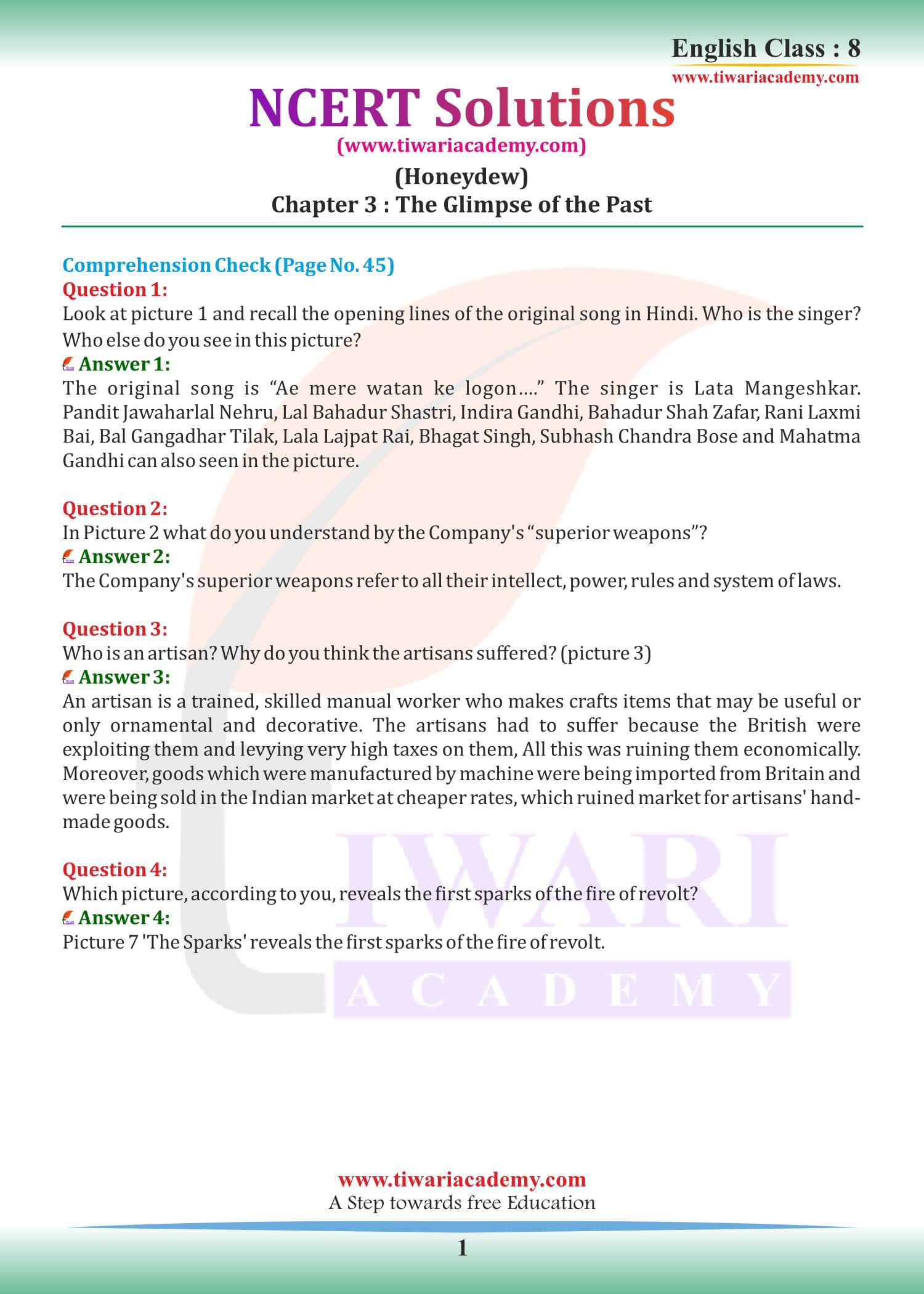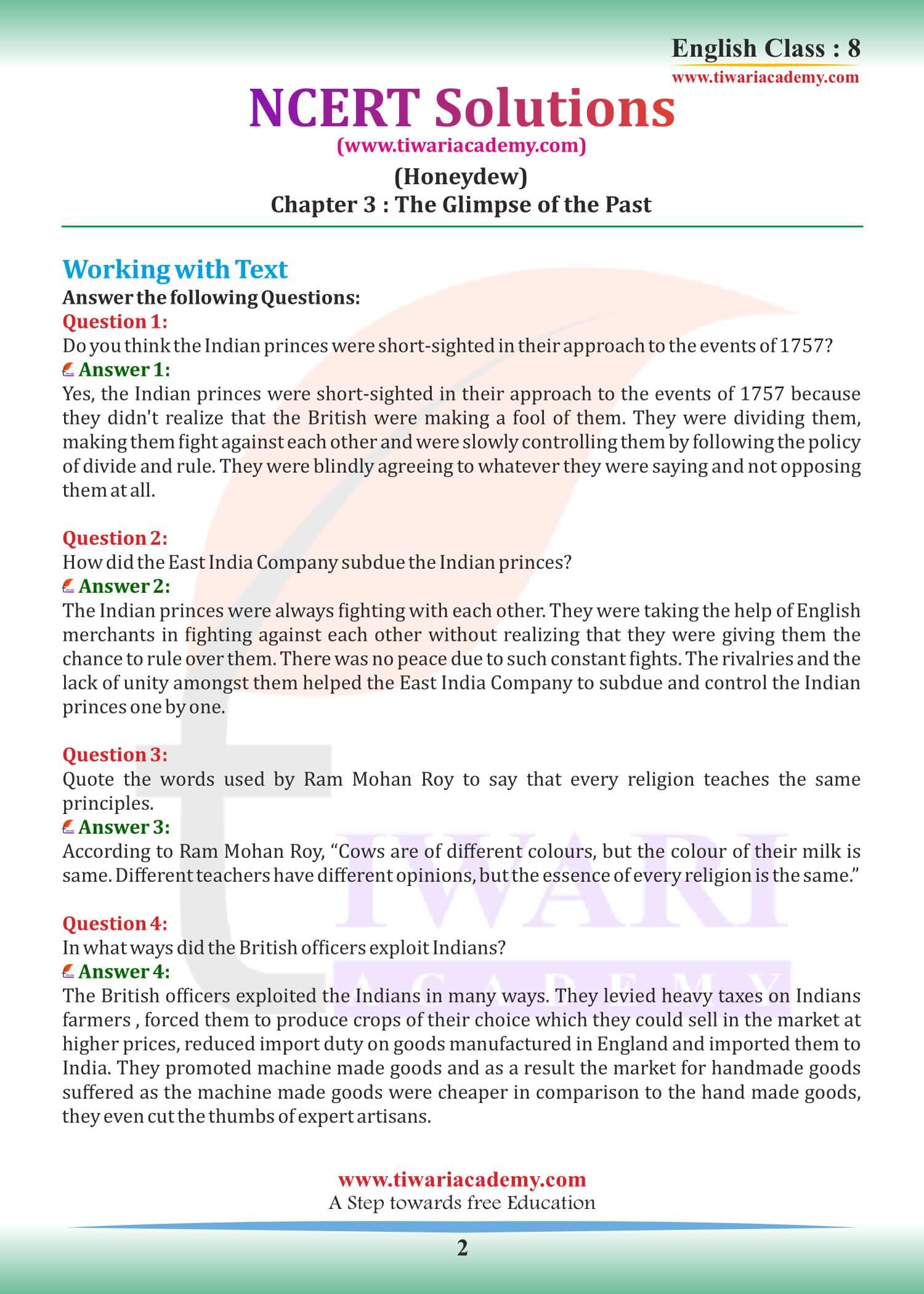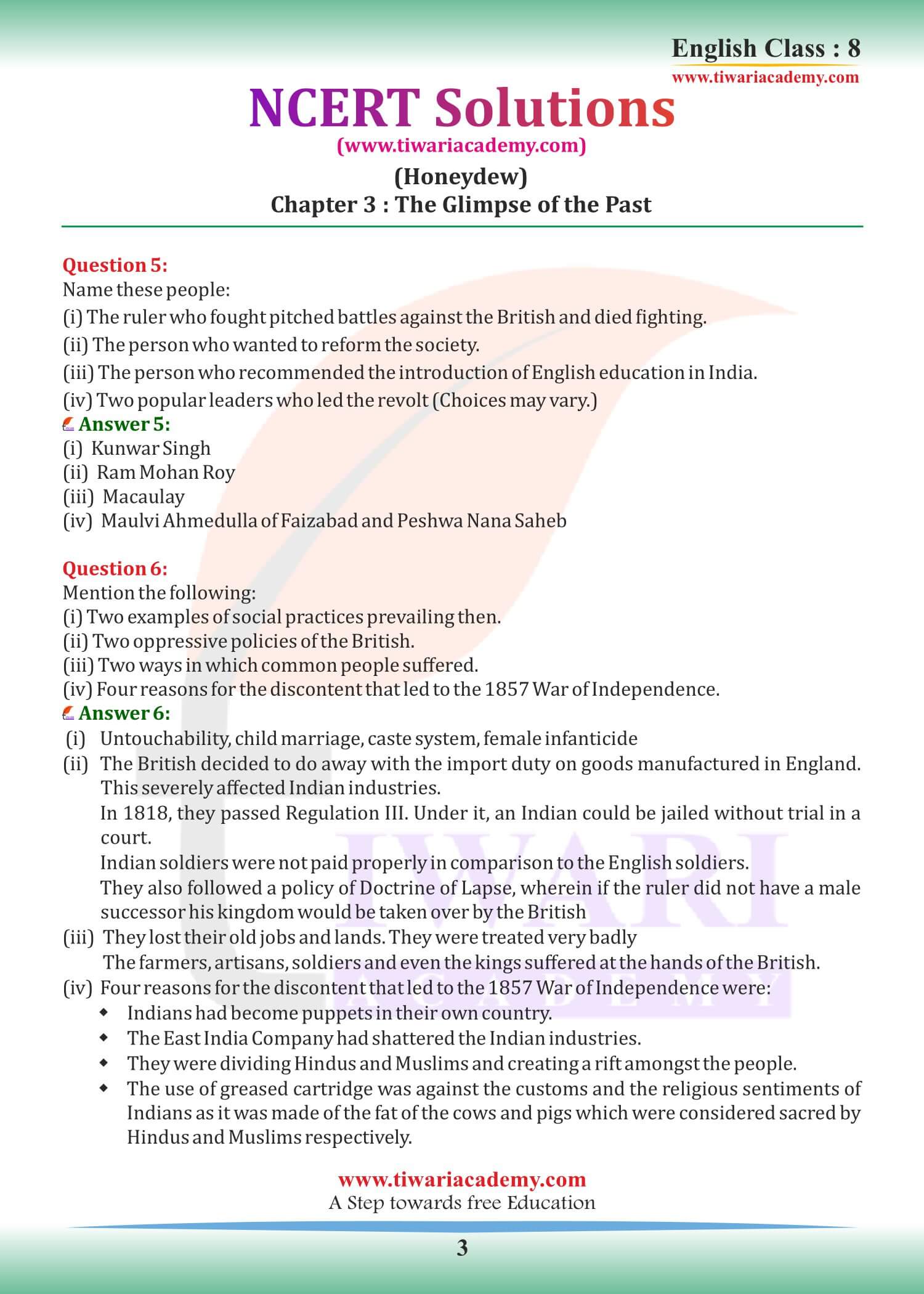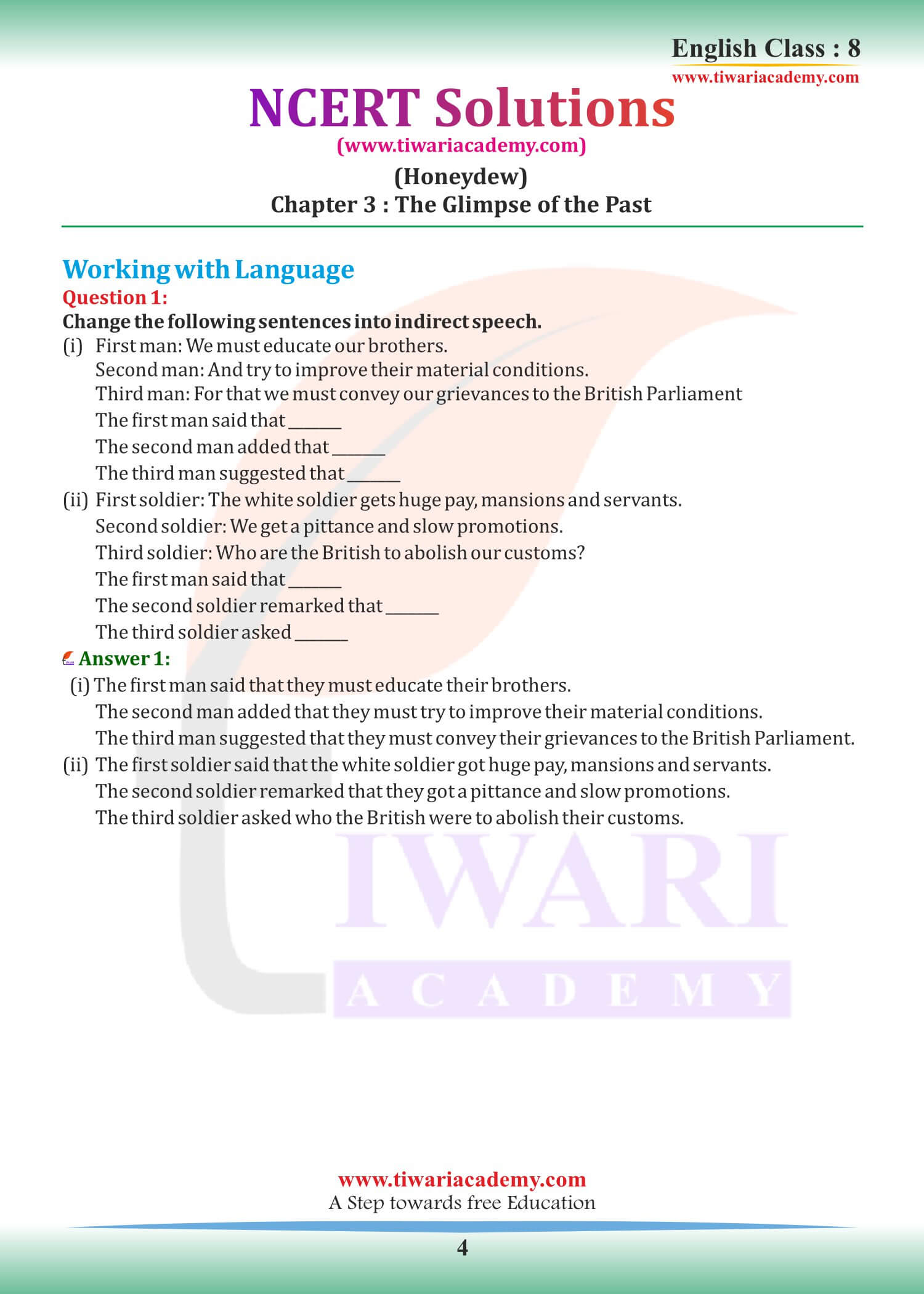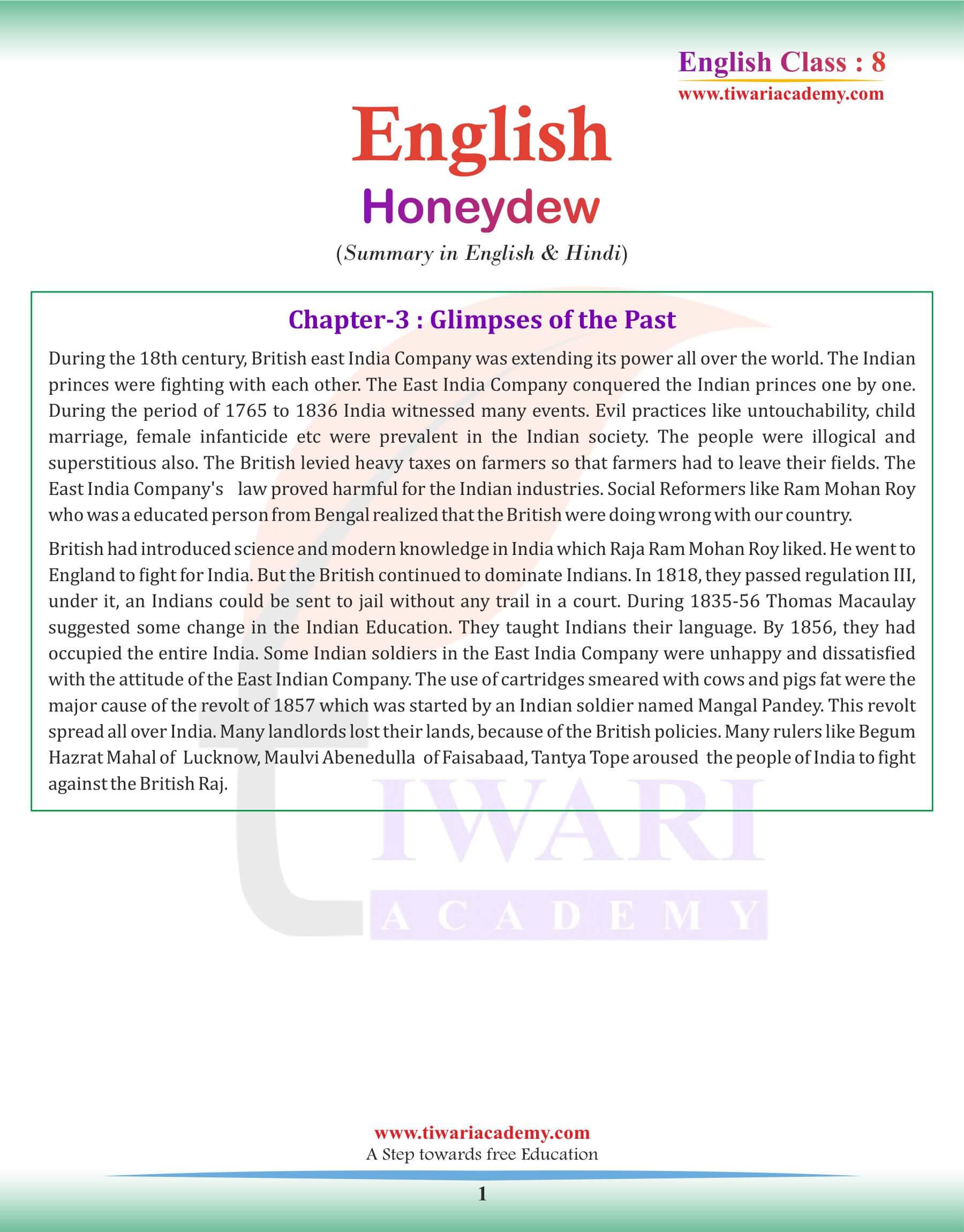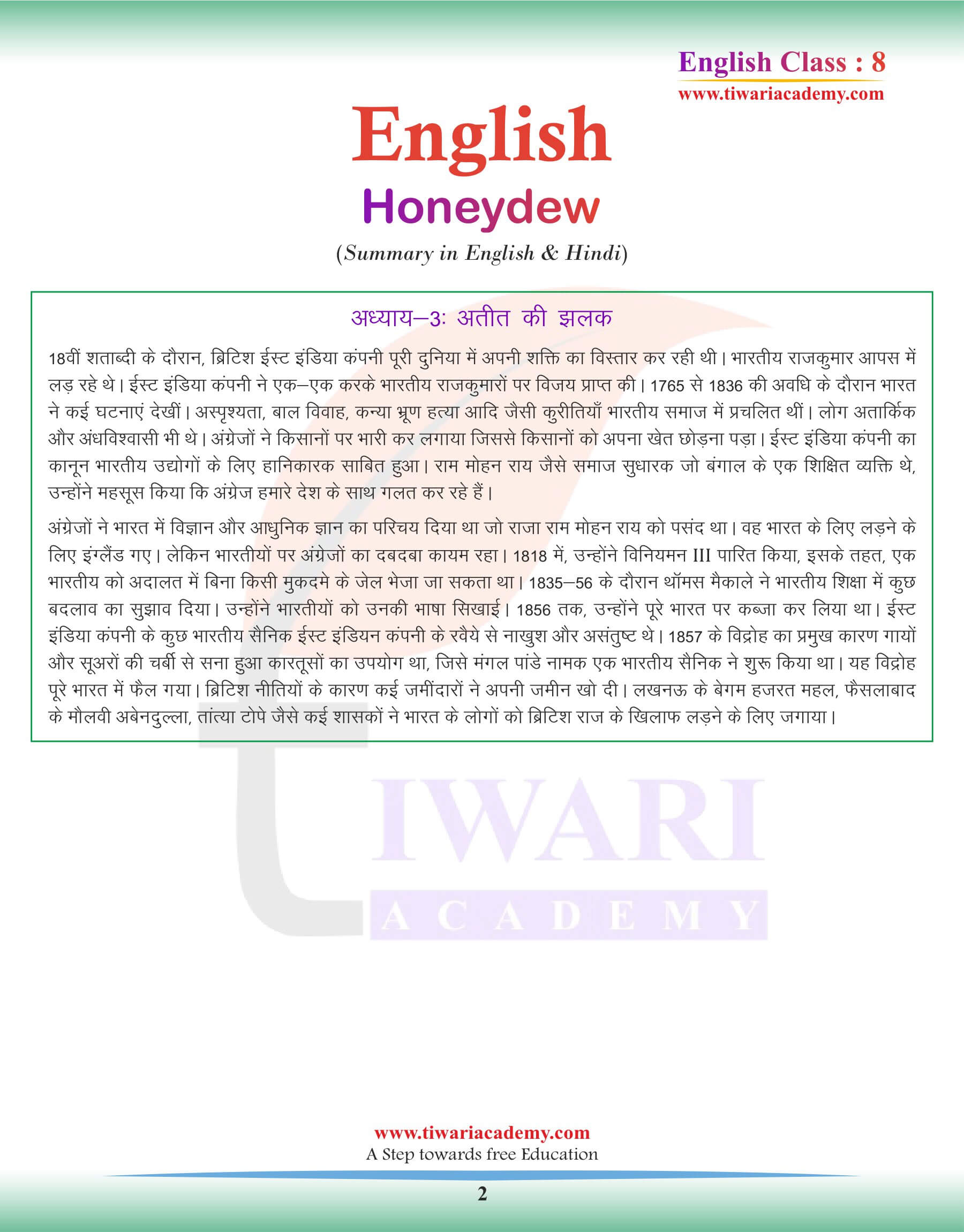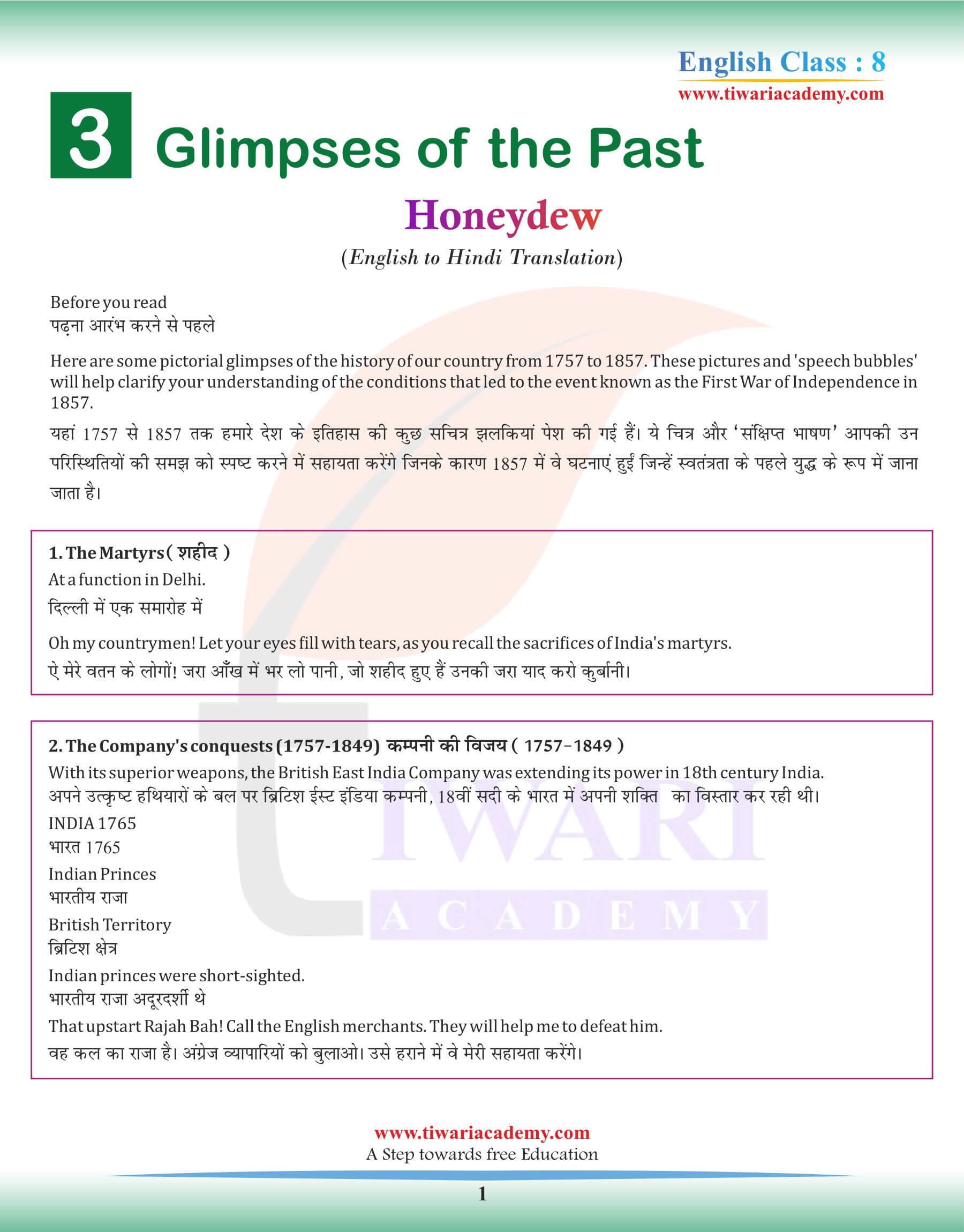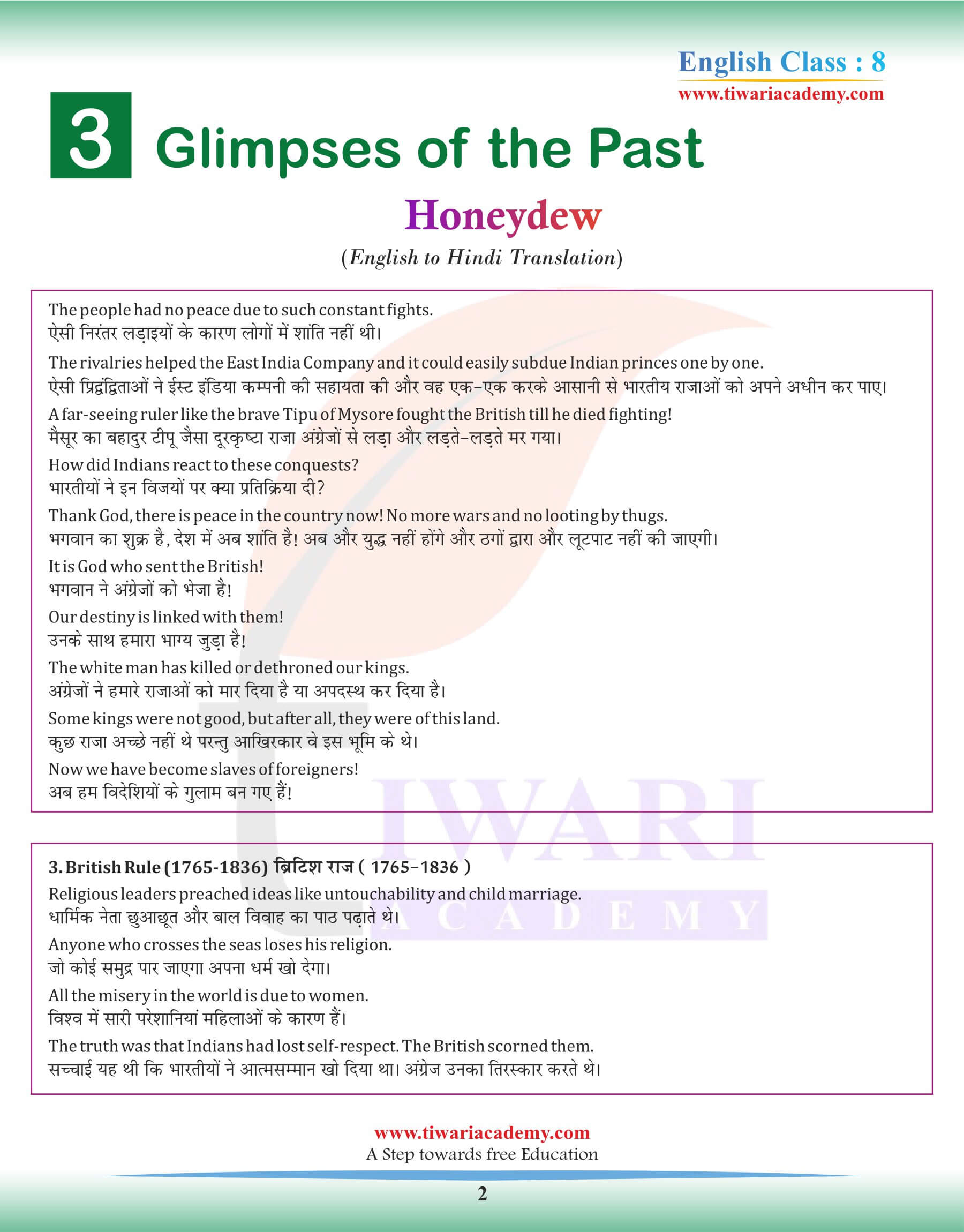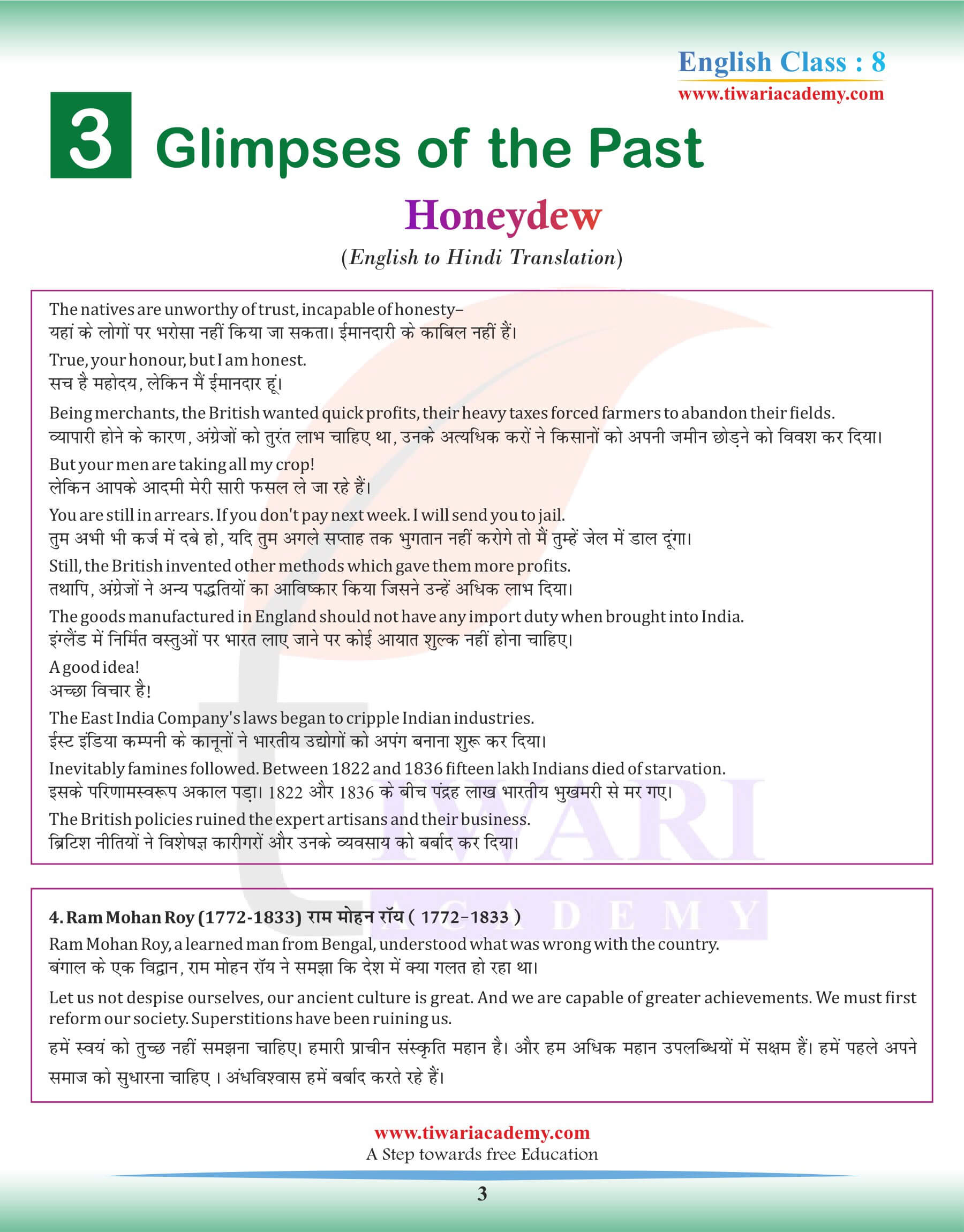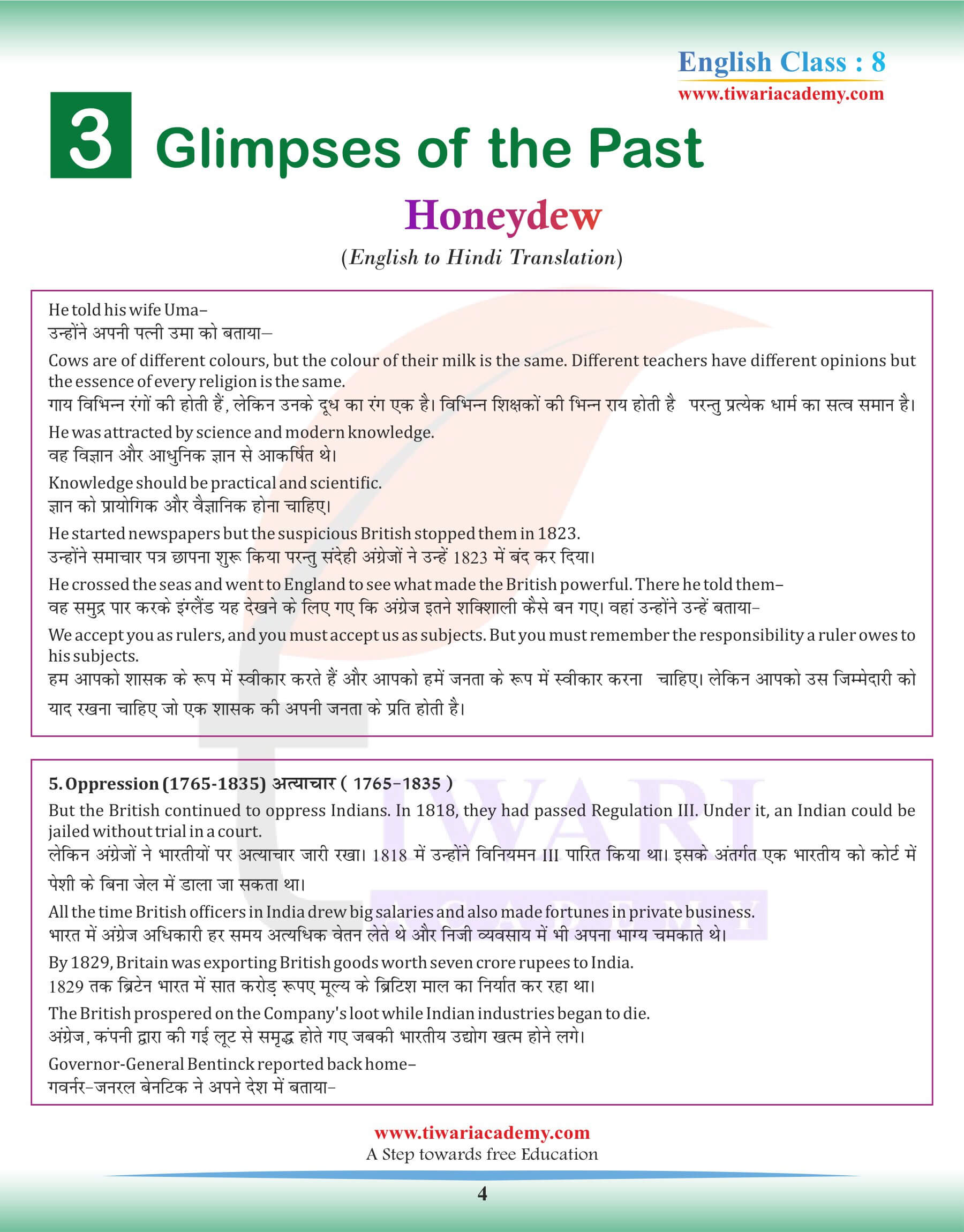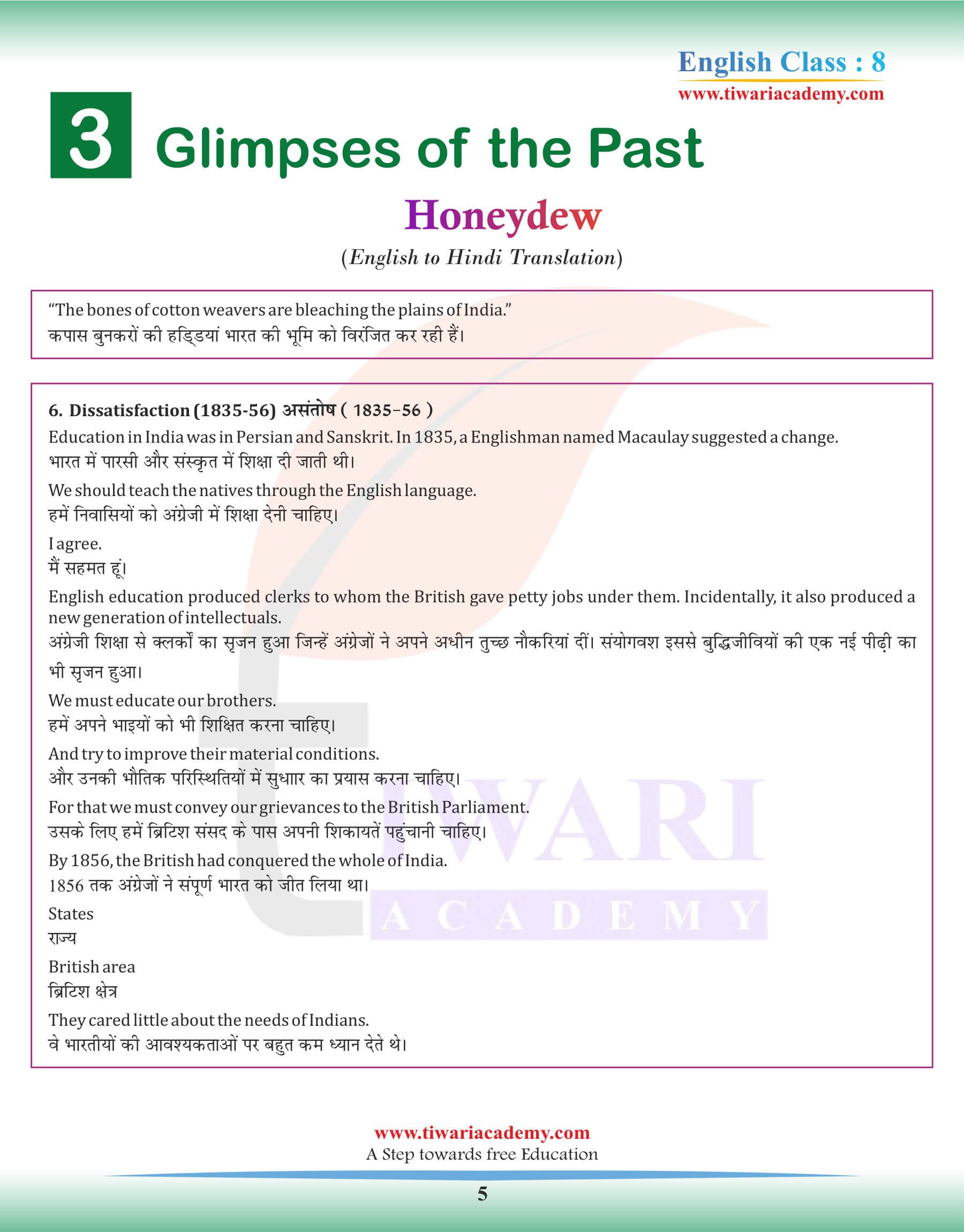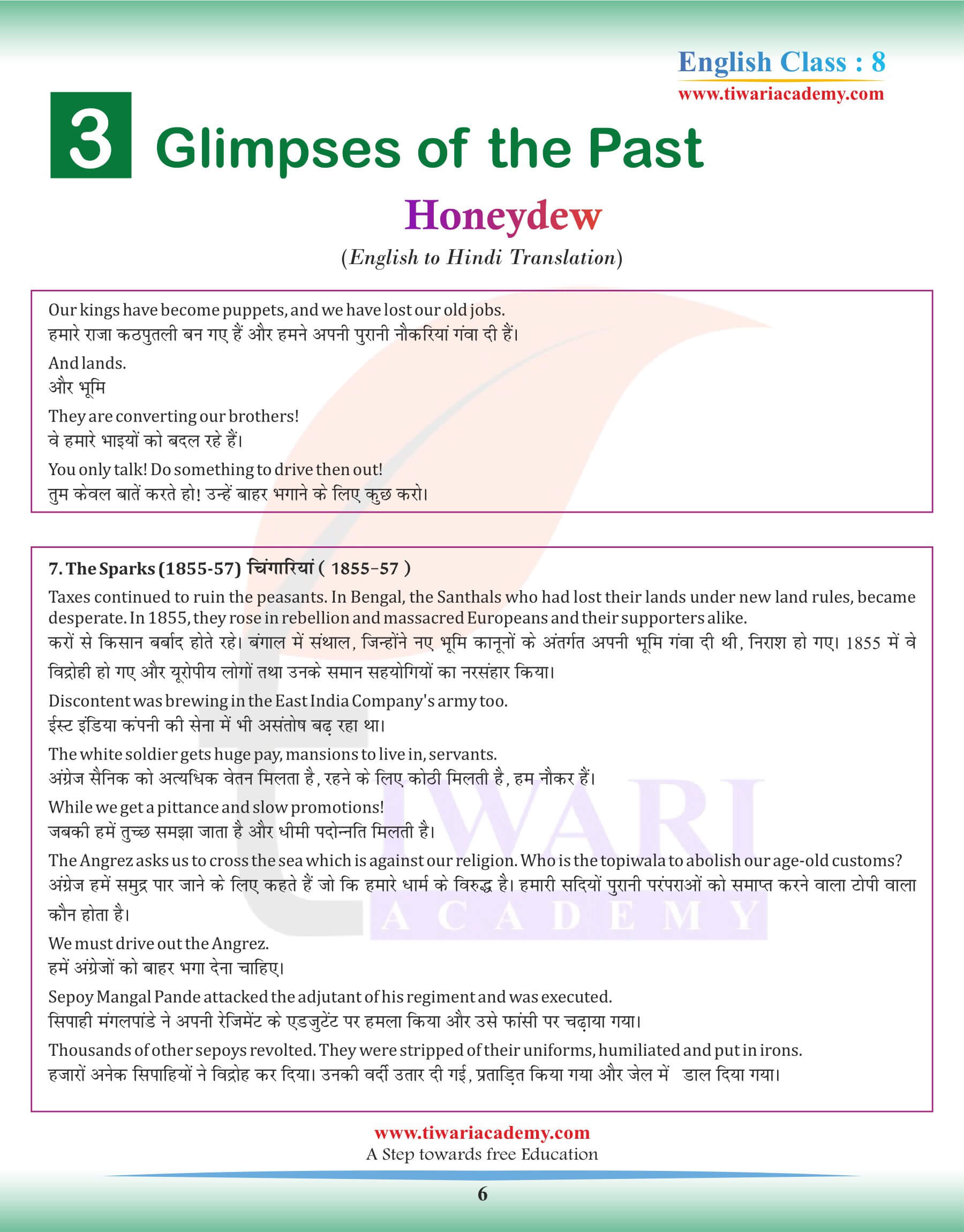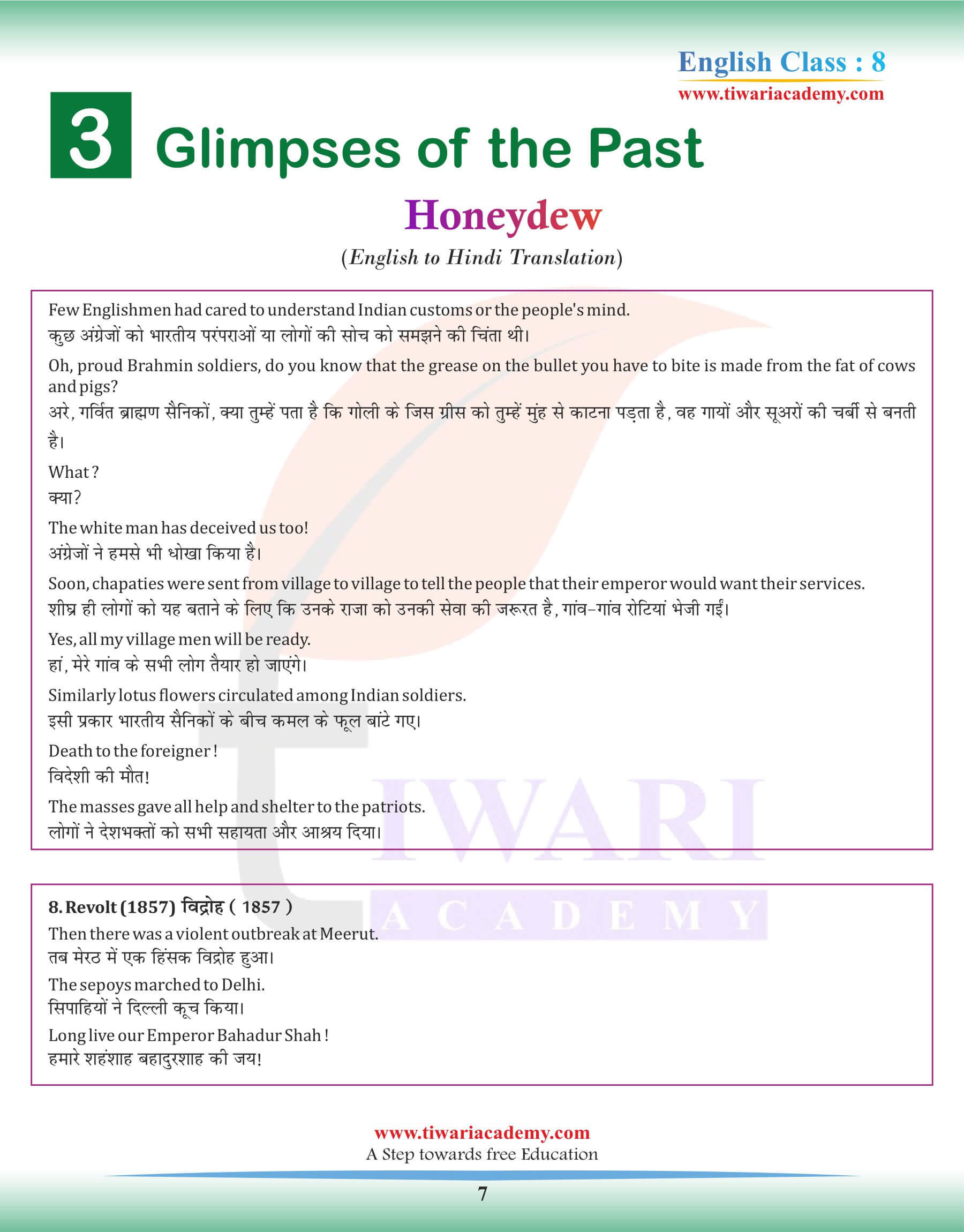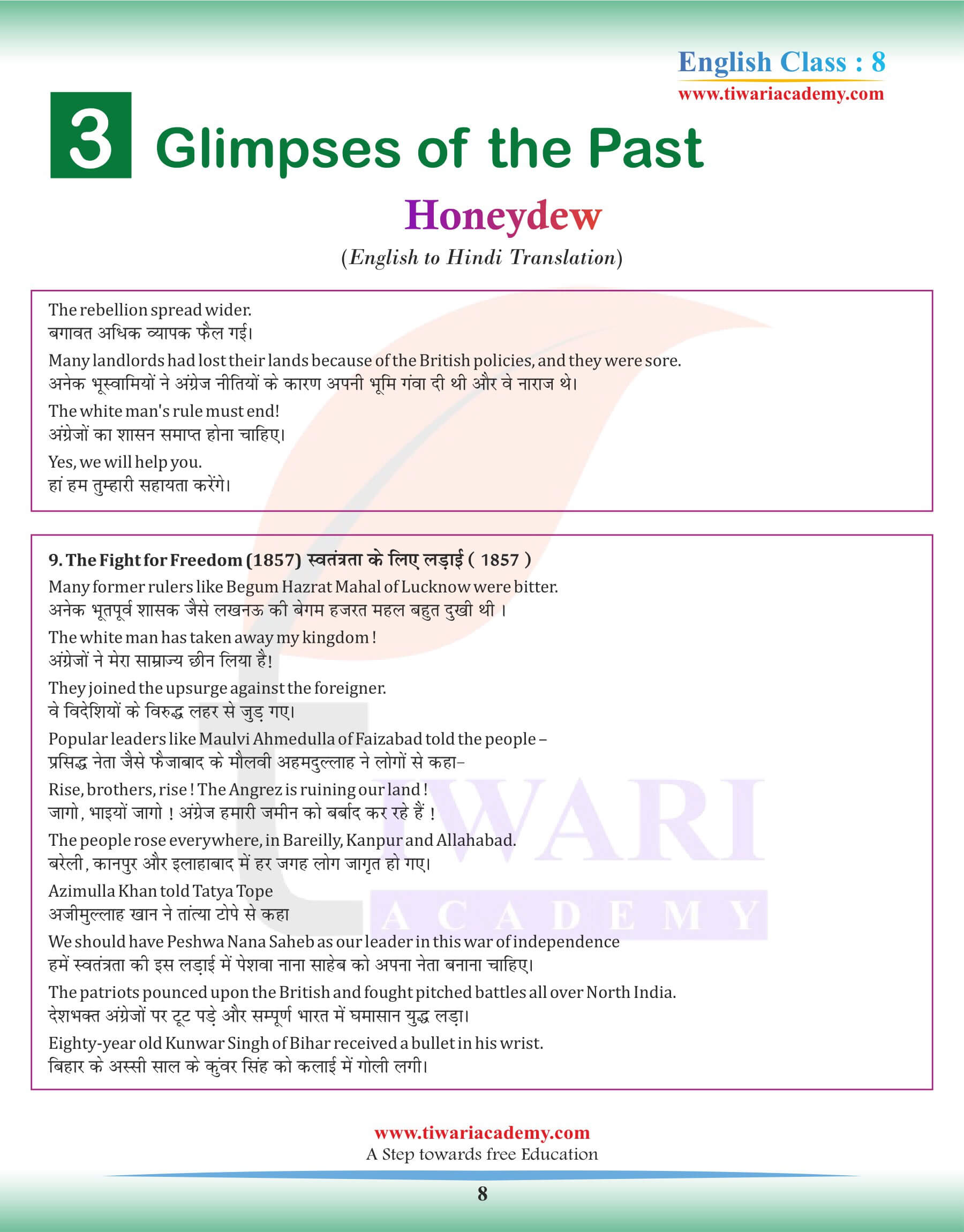NCERT Solutions for Class 8 English Honeydew Chapter 3 Glimpses of the Past with Hindi Translation, Summary in Hindi and English revised for session 2024-25. Get here working with the poem and grammar sections given at the end of chapter. Working with the text , reading, writing section and answers of questions given in comprehension check are given here based on new rationalised NCERT books issued for 2024-25 exams.
Class 8 English Honeydew Chapter 3 Question Answers
| Class: 8 | English |
| Textbook: | Honeydew – English Reader |
| Chapter: 3 | Glimpses of the Past |
| Contents: | NCERT Solutions, Summary, Translation |
| Academic Session: | 2024-25 |
Comprehension Check on Page 45
Look at picture 1 and recall the opening lines of the original song in Hindi. Who is the singer? Who else do you see in this picture?
The original song is “Ae mere watan ke logon….” The singer is Lata Mangeshkar.
Pandit Jawaharlal Nehru, Lal Bahadur Shastri, Indira Gandhi, Bahadur Shah Zafar, Rani Laxmi Bai, Bal Gangadhar Tilak, Lala Lajpat Rai, Bhagat Singh, Subhash Chandra Bose and Mahatma Gandhi can also see in the picture.
In picture 2 what do you understand by the Company’s “superior weapons”?
The Company’s superior weapons refer to all their intellect, power, rules and system of laws.
Who is an artisan? Why do you think the artisans suffered?
An artisan is a trained, skilled manual worker who makes crafts items that may be useful or only ornamental and decorative. The artisans had to suffer because the British were exploiting them and levying very high taxes on them, all this was ruining them economically. Moreover, goods which were manufactured by machine were being imported from Britain and were being sold in the Indian market at cheaper rates, which ruined market for artisans’ hand-made goods.
Which picture, according to you, reveals the first sparks of the fire of revolt?
Picture 7 ‘The Sparks’ reveals the first sparks of the fire of revolt.
Working with the Text
Answer the following questions.
Do you think the Indian princes were short-sighted in their approach to the events of 1757?
Yes, the Indian princes were short-sighted in their approach to the events of 1757 because they didn’t realize that the British were making a fool of them. They were dividing them, making them fight against each other and were slowly controlling them by following the policy of divide and rule. They were blindly agreeing to whatever they were saying and not opposing them at all.
How did the East India Company subdue the Indian princes?
The Indian princes were always fighting with each other. They were taking the help of English merchants in fighting against each other without realizing that they were giving them the chance to rule over them. There was no peace due to such constant fights. The rivalries and the lack of unity amongst them helped the East India Company to subdue and control the Indian princes one by one.
Quote the words used by Ram Mohan Roy to say that every religion teaches the same principles.
According to Ram Mohan Roy, “Cows are of different colours, but the colour of their milk is same. Different teachers have different opinions, but the essence of every religion is the same.”
In what ways did the British officers exploit Indians?
The British officers exploited the Indians in many ways. They levied heavy taxes on Indians farmers, forced them to produce crops of their choice which they could sell in the market at higher prices, reduced import duty on goods manufactured in England and imported them to India. They promoted machine made goods and as a result the market for handmade goods suffered as the machine made goods were cheaper in comparison to the hand made goods, they even cut the thumbs of expert artisans.
Question 5:
Name these people.
(i) The ruler who fought pitched battles against the British and died fighting.
(ii) The person who wanted to reform the society.
(iii) The person who recommended the introduction of English education in India.
(iv) Two popular leaders who led the revolt (Choices may vary.)
Answer 5:
(i) Kunwar Singh
(ii) Ram Mohan Roy
(iii) Macaulay
(iv) Maulvi Ahmedulla of Faizabad and Peshwa Nana Saheb
Question 6:
Mention the following.
(i) Two examples of social practices prevailing then.
(ii) Two oppressive policies of the British.
(iii) Two ways in which common people suffered.
(iv) Four reasons for the discontent that led to the 1857 War of Independence.
Answer 6:
(i) Untouchability, child marriage, caste system, female infanticide
(ii) The British decided to do away with the import duty on goods manufactured in England. This severely affected Indian industries.
In 1818, they passed Regulation III. Under it, an Indian could be jailed without trial in a court.
Indian soldiers were not paid properly in comparison to the English soldiers.
They also followed a policy of Doctrine of Lapse, wherein if the ruler did not have a male successor his kingdom would be taken over by the British
(iii) They lost their old jobs and lands. They were treated very badly. The farmers, artisans, soldiers and even the kings suffered at the hands of the British.
(iv) Four reasons for the discontent that led to the 1857 War of Independence were:
- Indians had become puppets in their own country.
- The East India Company had shattered the Indian industries.
- They were dividing Hindus and Muslims and creating a rift amongst the people.
- The use of greased cartridge was against the customs and the religious sentiments of Indians as it was made of the fat of the cows and pigs which were considered sacred by Hindus and Muslims respectively.
Working with Language
Change the following sentences into indirect speech.
(i) First man: We must educate our brothers.
Second man: And try to improve their material conditions.
Third man: For that we must convey our grievances to the British Parliament.
The first man said that ______________________________________________
___________________________________________________________________
The second man added that _______________________________________
___________________________________________________________________
The third man suggested that ________________________________________
___________________________________________________________________
(ii) First soldier: The white soldier gets huge pay, mansions and servants.
Second soldier: We get a pittance and slow promotions.
Third soldier: Who are the British to abolish our customs?
The first soldier said that ___________________________________________
___________________________________________________________________
The second soldier remarked that __________________________________
__________________________________________________________________
The third soldier asked __________________________________________
_________________________________________________________________
Answer:
(i) The first man said that they must educate their brothers.
The second man added that they must try to improve their material conditions.
The third man suggested that they must convey their grievances to the British Parliament.
(ii) The first soldier said that the white soldier got huge pay, mansions and servants.
The second soldier remarked that they got a pittance and slow promotions.
The third soldier asked who the British were to abolish their customs.
Working with the Poem
Read the first stanza and think. (i) Is Macavity a cat really? (ii) If not, who can Macavity be?
(i) No, Macavity is not a cat really.
(ii) Macavity is just an imaginary character created by the poet whose deeds and actions resemble those of a crook’s.
Complete the following sentences. (i) A master criminal is one who _________. (ii) The Scotland Yard is baffled because _________. (iii) _________because Macavity moves much faster than them.
(i) A master criminal is one who disobeys the law.
(ii) The Scotland Yard is baffled because whenever they reached the crime scene, they were unable to trace Macavity.
(iii) Nobody could catch Macavity at the crime scene because Macavity moves much faster than them.
“A cat, I am sure, could walk on a cloud without coming through”. (Jules Verne). Which law is Macavity breaking in the light of the comment above?
In the light of the above comment, Macavity was breaking the law of gravity.
Read stanza 3, and then, describe Macavity in two or three sentences of your own.
Macavity is a ginger cat. She is very giant but skinny with hollow eyes and brows intensely wrinkled with ideas. While its head is extremely domed, its coat is filthy and whiskers are messy. It moves its head side-to-side and it is always alert even when one thinks that it is half-asleep.
Say ‘False’ or ‘True’ for each of the following statements. (i) Macavity is not an ordinary cat. (ii) Macavity cannot do what a fakir can easily do. (iii) Macavity has supernatural powers. (iv) Macavity is well-dressed, smart and bright. (v) Macavity is a spy, a trickster and a criminal, all rolled in one.
(i) True
(ii) False
(iii) True
(iv) False
(v) True
Having read the poem, try to guess whether the poet is fond of cats. If so, why does he call Macavity a fiend and monster?
Yes, it seems that the poet is interested in cats, he loves them a lot. He calls Macavity a “fiend” and a “monster” because he is trying to portray a wicked side. He has used the cat to construct a harmful, an evil character who is a culprit and who absconds easily from police. The fast movements of the cat and its mystifying eyes have influenced him to produce this wicked character in the form of a cat.
Has the poet used exaggeration for special effect? Find a few examples of it and read those lines aloud.
Yes, the poet has used exaggerations such as the cat’s defiance of gravity and it being called a ‘monster of depravity’ and a ‘fiend’ in order to increase the ambiguity near the cat. Since the cat is very quick and fast, nobody from the Scotland Yard to the flying squad is able to catch it at the crime scene, these exaggerations have been used by Eliot to emphasize on this horrible, wicked and unexplained nature of Macavity.
Examples:
(i) ‘He’s the bafflement of Scotland Yard, the Flying Squad’s despair’.
(ii) ‘He breaks the law of gravity’.
(iii) ‘His powers of levitation would make a fakir stare.’
(iv) ‘He’s a fiend in feline shape, a monster of depravity.’
Reference to Context – 1
The rivalries helped the but India Company and it could easily subdue Indian princes one by one. A far-seeing ruler like the brave Tipu of Mysore fought the British till he died fighting! Thank God, there is peace in the country now! No more wars and no looting by thugs! It is God who sent the British! Our destiny is linked with them! How did Indians react to these conquests? The white man has killed or dethroned our kings. Some kings were not good, but after all, they were of this land. Now we have become slaves of foreigners!
Answer the following Questions
- What was the fact about the defeat of the Indian prince?
- What was the reaction of the commoners?
- Who were Britishers to the common folk?
- What was the regret the villagers have for Indian princes?
- Find suitable word phrases which means ‘visionary’.
Reference to Context – 2
The truth was that the Indians had lost self-respect. The British scorned them. The native is unworthy of trust. incapable of honesty – True, your honor, but I am honest. Being merchants, the British wanted quick profits. their heavy gaze. forced farmers to abandon their fields. But your men are taking all my crops! You are still in arrears. If you don’t pay next week. I will send you to jail. St,iU, the British invented other methods which gave them more profits. The goods manufactured in England should not have any import duty when brought into India. A good idea! The East India Company’s laws began to cripple Indian industries. Inevitably famines
Answer the following Questions
- What was the conflict in Bepin Babu’s mind?
- Where was Bepin Babu in October 1958?
- Why did Bepin say ‘No, there was To Haridas’?
- What were the ‘intimate details’ that Parimal Ghose was aware of?
- Explain ‘losing his mind’.
Reference to Context – 3
Doubtless, it was Bepin’s condition that made Chunilal leave without mentioning anything about a job. Paresh Chanda was a young physician with a pair of bright eyes and a sharp nose. He became thoughtful when he heard about Bepin Babu’s symptoms. “Look, Dr. Chanda,” said Bepin Babu desperately, “You must cure me of this horrible illness. I can’t tell you how it’s affecting my work.” Dr. Chanda shook his head. ‘You know what, Mr. Choudhury,” he said. “I’ve never had to deal with a case such as yours. Frankly, this is quite outside my field of experience. But I have one suggestion. I don’t know if it’ll work, but it’s worth a try. It cannot harm.” Bepin Babu leaned forward anxiously.
Answer the following Questions
- What did Chunni Lai come for?
- Describe the appearance of Paresh Chanda.
- Why was Bepin Babu desperate?
- What was the analysis of Dr. about the mental condition of Bepin Babu?
- What was the suggestion of his doctor?
Reference to Context – 4
Getting off the train at Ranchi next morning, he realised at once that he had never been there before. He came out of the station, took a taxi, and drove around the town for a while. He realised that the streets, the buildings, the hotels, the bazaars, the Morabadi Hill – with none of these had he the slightest acquaintance. Would a trip to the Hudroo Falls help? He didn’t believe so, but, at the same time, he didn’t wish to leave with the feeling that he hadn’t tried enough. So he arranged for a car and left for Hudroo in the afternoon. At five o’clock the same afternoon in Hudroo, two Gujarati gentlemen from a group of picnickers discovered Bepin Babu lying unconscious beside a boulder. When he came round, the first thing Bepin Babu said was, “I’m finished. There’s no hope left.”
Answer the following Questions
- How was he sure that he had not visited Ranchi before?
- Why did the trip to the Hudroo Falls plan?
- What had happened to Bepin Babu in Hudroo?
- Why do you think Bepin said ‘I’m finished’?
- Why was ‘no hope left’ for Bepin Babu?
Answers of Reference to Context – 1
1. The rivalries helped the East India Company to win over the Indian princess.
2. The commoners were satisfied as there were no wars and loots
3. Britishers were apostles of good as there was peace around.
4. The villagers were concerned about the king as some of them were good and above all, they were of the motherland.
5. Far-seeing.
Answers of Reference to Context – 2
1. Bepin Babu was working in the office and he was performing his duties with responsibility. He spoke for half an hour at an important meeting. Yet he was not sure of his mental state.
2. Bepin Babu was in Kanpur in October 1958 at his friend Haridas Bagchi’s place.
3. Bepin wanted to contact Haridas, then he remembered that Haridas had left with his wife for Japan some weeks ago.
4. Parimal Ghose knew about the intimate details about the bag of books, wife’s death, brother’s insanity etc.
5. Bepin was initially confident that Parimal mistook him for someone else. But his lie shook him. He started doubting himself.
Answers of Reference to Context – 3
1. Chunni Lai visited Bepin’s place to take his help in finding a suitable job for him.
2. Paresh Chandra was a young physician with a pair of bright eyes and a sharp nose.
3. Bepin Babu was desperate to get a cure for his horrible illness of forgetfulness.
4. Bepin Babu visited the doctor to analyse the medical condition and he could not find anything suspicious in him.
5. The doctor suggested him to visit Ranchi. Once again to get the real experience he could make out if he had visited those places.
Answers of Reference to Context – 4
1. Bepin Babu visited Ranchi by hiring a taxi. He realized that the streets, the buildings, the hotels, the bazaars etc were not familiar at all.
2. Bepin Babu was sure that he had not visited the place before. But he did not want to take a chance so he went to Hudroo Falls.
3. Bepin Babu was lying unconscious beside a boulder. Two Gujarati gentlemen found him.
4. Bepin visited Ranchi with the hope to remember any incident or place to relate his previous trip to Ranchi. But he couldn’t relate anything. He was thus in a state of shock that he had lost his memory.
5. Bepin Babu lost faith in his memory. He was devastated. He worked hard and managed solutions by engaging himself in reading books. The false story had so much impact on his mind that he lost all his hope of leading a normal life.
Is the documentary in chapter 3 Class 8th English Honeydew Interesting?
The chapter 3 is an interesting and full of knowledge documentary. The documentary taught us the important incidents and the points of how the great leaders and kneel in front of invaders and how they help is taken from foreigners to win the battle end up losing the countries. This also shows the starting of the revolution and the sacrifices the great people made.
Is chapter 3 of class 8th English Honeydew lengthy?
Documentaries are all about the real incidents and important dates and their significant effects on the lives of the masses. This is the reason documentaries are lengthy but the author made it in form of graphic comic style which made it interesting to read.
Can we cover the entire chapter 3 of 8th English Honeydew in one day?
I think the chapter can be cover in one day but a revision of important dates and leaders are important to remember along with the names.
